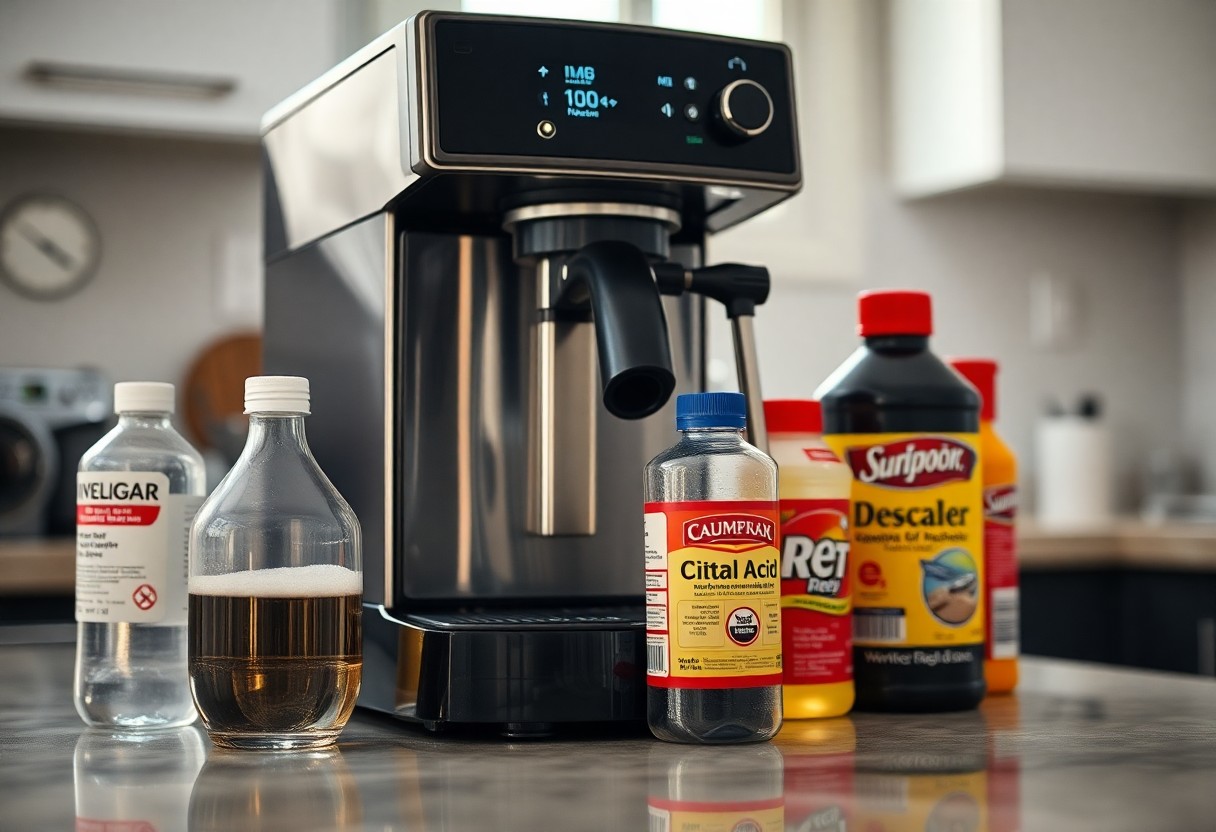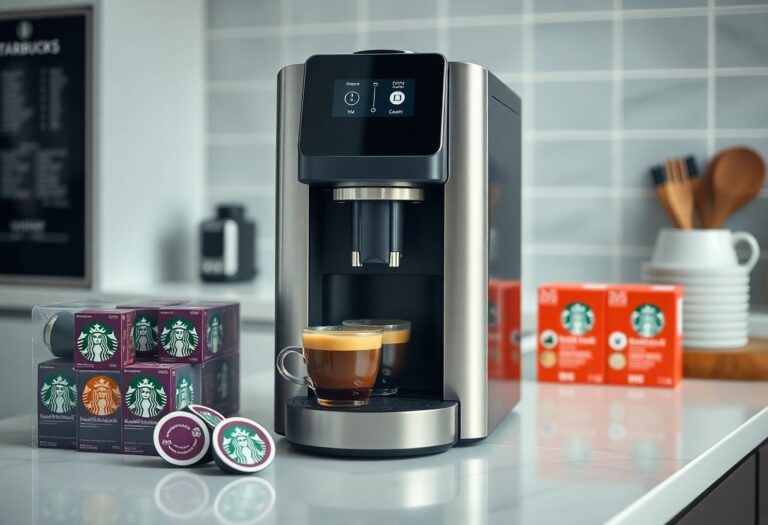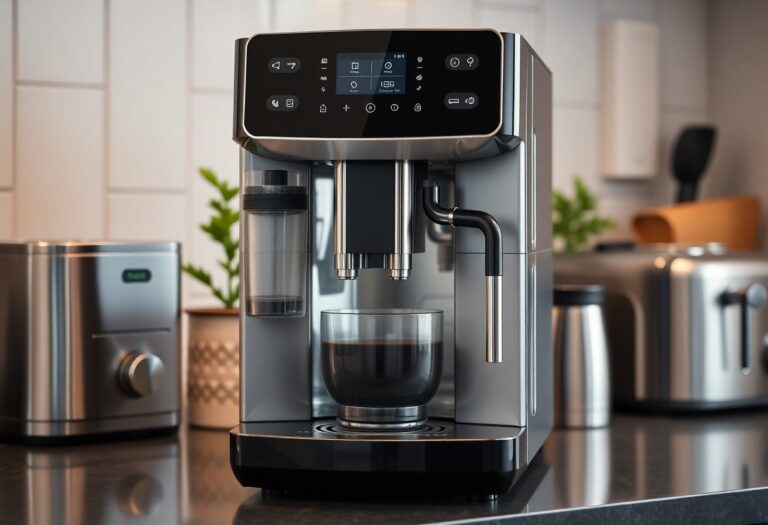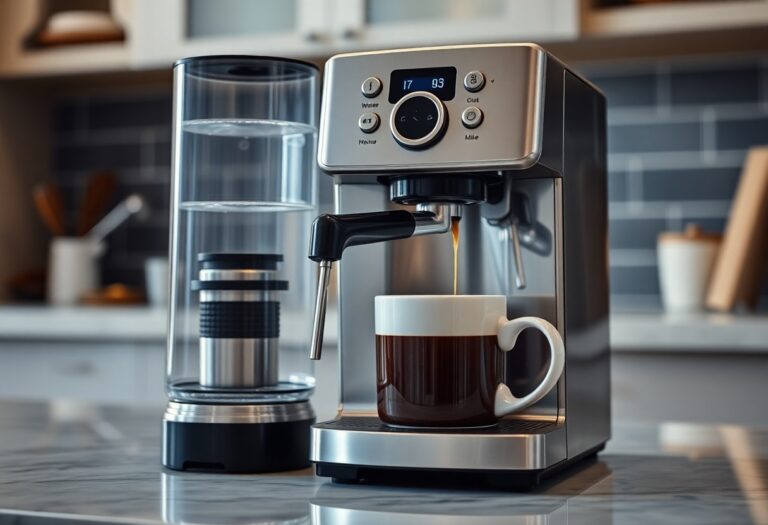What Can You Use to Descale a Coffee Machine – Alternative Solutions
There’s often a build-up of minerals in your coffee machine that can affect its performance and the taste of your brew. To keep your machine running smoothly, using a descaling solution is imperative, but you might be wondering what alternatives are available. Luckily, there are effective home remedies like vinegar and baking soda that can safely descale your equipment. Using these options not only helps prolong the life of your coffee machine but also ensures a better tasting cup of coffee, without breaking the bank.
Key Takeaways:
- White vinegar is a popular and effective option for descaling coffee machines, as its acidity helps to dissolve mineral buildup.
- Citric acid, available in powder form or as fresh citrus juice, serves as a natural descaler that can handle limescale effectively.
- Baking soda mixed with water can be used as a gentle descaling solution, providing cleaning power without harsh chemicals.
- Commercial descaling solutions are formulated specifically for coffee machines and often contain citric acid or other safe ingredients for effective cleaning.
- Regular descaling is recommended every 1-3 months, depending on water hardness and machine usage, to maintain optimal performance.
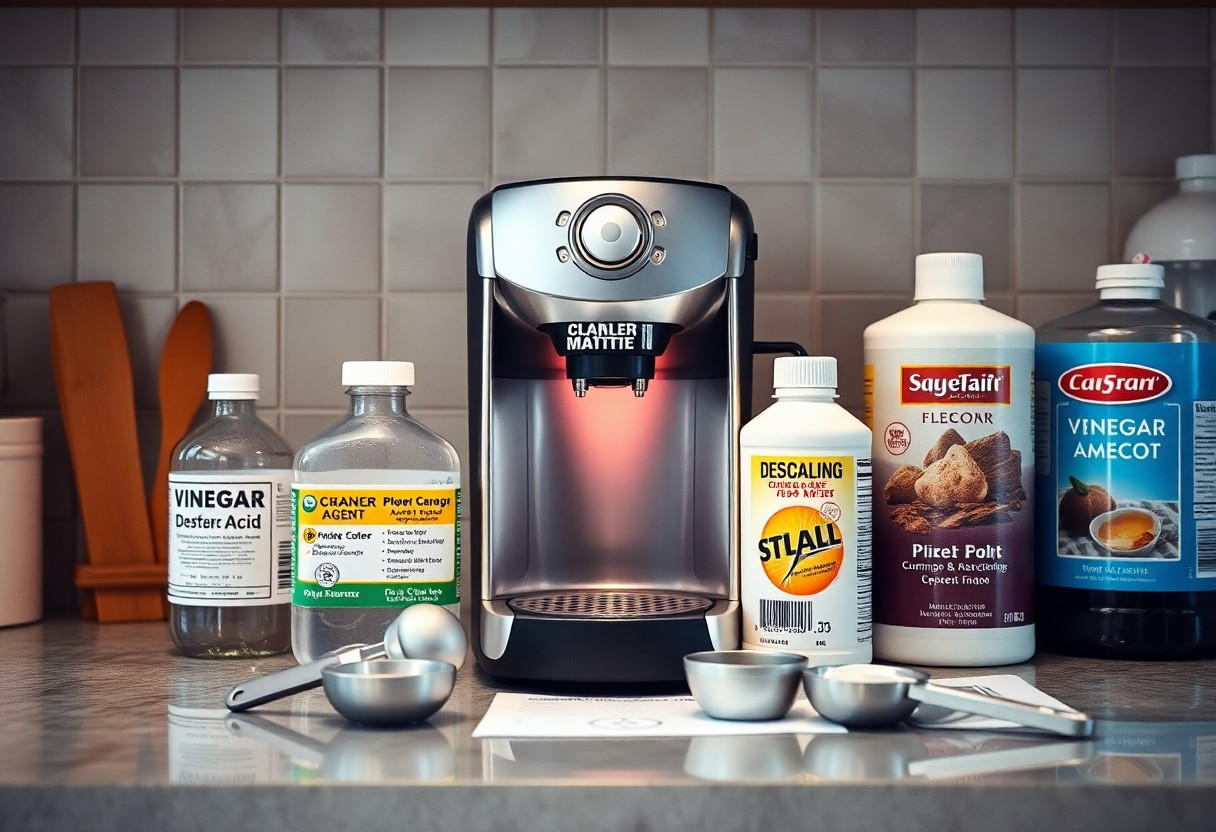
The Chemistry of Descaling Agents
Understanding the chemistry behind descaling agents is fundamental to effectively maintaining your coffee machine. Most descalers contain acidic components that react with mineral buildup, primarily calcium and magnesium, dissolving these deposits and restoring your machine’s efficiency. The specific pH and concentration of these acids determine their effectiveness and safety when used on your machine.
Common Acids and Their Effectiveness
Several common acids prove effective in removing scale from coffee machines. Citric acid is often favored for its non-toxic nature and efficiency in dissolving calcium deposits. Vinegar is also a popular choice, though it may be less potent in extreme cases. Phosphoric acid is commonly found in commercial descalers and works rapidly to breakdown tough mineral buildup, but care must be taken due to its stronger corrosive properties.
Comparing Natural and Commercial Solutions
When evaluating natural and commercial descaling solutions, the effectiveness, safety, and convenience of each approach weight heavily in decision-making. Natural methods like vinegar and citric acid are readily available and safe, but may require more frequent applications. Commercial descalers are often stronger and more efficient against stubborn scale but can contain harsh chemicals that might affect your machine’s components.
| Natural Descalers | Commercial Descalers |
| Available ingredients like vinegar and citric acid | Formulated solutions with specific acidic profiles |
| Safer for the environment | May contain corrosive agents |
| May require multiple applications | Often single-use effectiveness |
Natural descalers offer a holistic approach to cleaning that resonates with many users who prefer eco-friendly solutions. On the other hand, commercial options provide a targeted solution that is often more efficient for deep cleaning tough scale deposits. The choice between these methods largely depends on your specific needs, machine type, and preference for natural versus synthetic solutions.
| Natural Solutions | Commercial Solutions |
| Cost-effective | Fast acting |
| Non-toxic | Specialized for different machines |
| May lack potency on severe scale | Could cause damage if misused |
Household Items That Do the Job
Descaling your coffee machine doesn’t always require store-bought solutions; you likely have effective alternatives right at home. Familiar household items like vinegar and baking soda possess the necessary properties to break down mineral buildup without damaging your appliance. These economical options not only save you money but also promote a more sustainable lifestyle. Let’s explore how these everyday staples can restore your coffee machine’s luster.
Vinegar: The Age-Old Solution
Utilizing white vinegar as a descaling agent is a time-tested method that many swear by. Its high acidity makes it exceptionally effective at dissolving calcium deposits, effectively restoring your machine’s function. To use, mix equal parts water and vinegar, run the solution through a brew cycle, and follow with a couple of fresh water cycles to eliminate any residual taste. This simple approach not only keeps your coffee tasting fresh but also extends the lifespan of your machine.
Baking Soda: A Gentle Alternative
Baking soda offers a gentler approach to descaling your coffee machine, making it suitable for more delicate appliances. Combining it with water creates a weak alkaline solution that helps to break down mineral deposits without causing damage. To execute this method, dissolve a couple of tablespoons of baking soda in water, run it through the brew cycle, followed by plain water to flush out any leftover residue. This method not only helps with descaling but can also enhance the overall cleanliness of your machine.
If you’re considering using baking soda, keep in mind that while it’s less aggressive than vinegar, you might need to repeat the process more than once for extensive mineral buildup. Its non-toxic nature makes it an excellent addition to your regular maintenance routine, ensuring your coffee tastes great while being gentle on the machine’s components. The result is a coffee maker that functions well and serves delicious brews, all while being environmentally friendly.
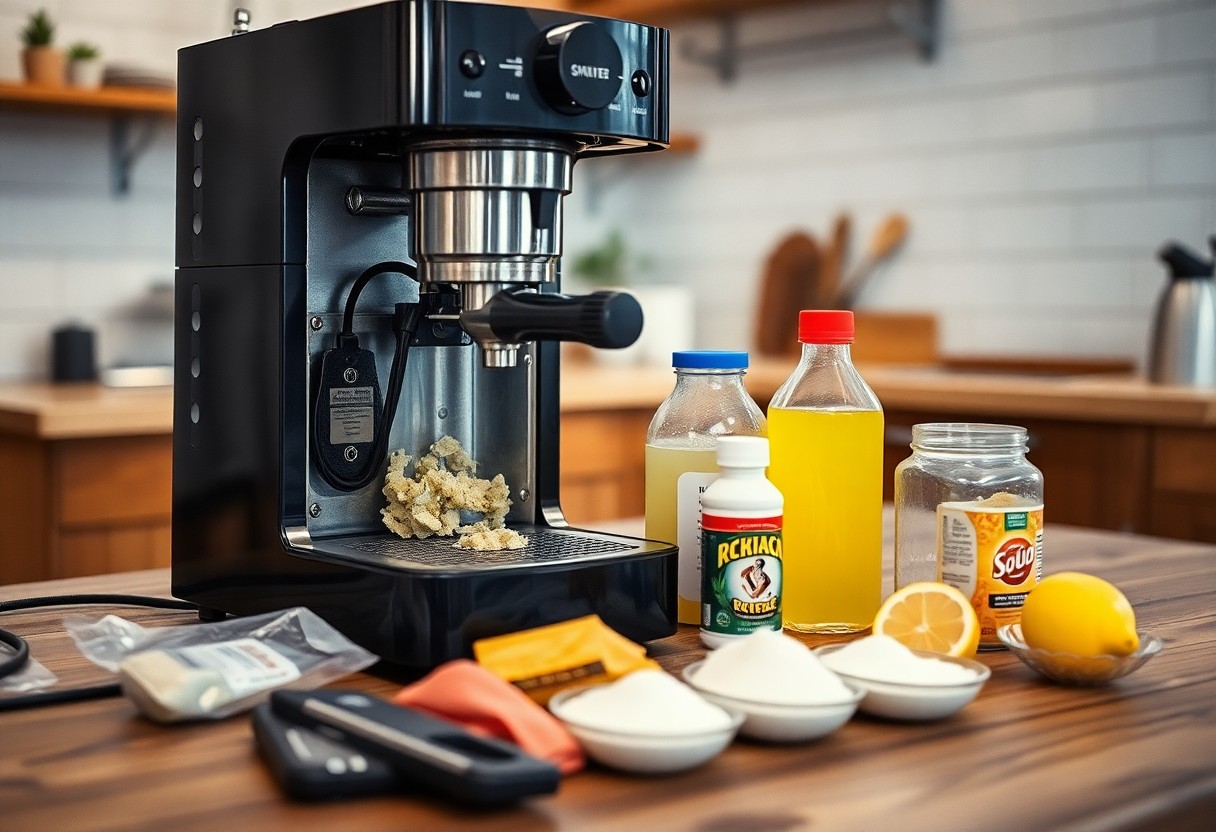
Unconventional Descaling Solutions
While traditional methods like vinegar are widely recommended, other unconventional solutions can also effectively descale your coffee machine. You may want to explore these alternatives for a fresh approach that could yield surprising results. For instance, How to descale a current coffee machine with vinegar effectively showcases the versatility of different substances. By expanding your options, you can ensure a more efficient and cleaner brewing process.
Citric Acid: A Powerful Citrus Option
Citric acid is a natural and potent descaler commonly found in citrus fruits. When used in a diluted form, this organic compound can effectively break down clogs and mineral deposits within your coffee machine. Its natural acidity works wonders, often outperforming harsher chemical agents while being safer for the environment.
Lemon Juice: Flavorful and Functional
Lemon juice not only adds a fresh flavor to your beverages but also serves as an effective descaling agent. The high acidity of lemon juice helps dissolve calcium and limescale buildup, keeping your coffee machine in optimal working condition. Moreover, it’s completely food-safe, making it a fantastic choice if you prefer using natural products. Regular descaling with lemon juice can enhance the taste of your coffee while prolonging the life of the machine, ensuring each cup remains delightful.
Best Practices for Descaling Your Coffee Machine
Regular descaling is vital for your coffee machine’s longevity and performance. By following best practices, you can ensure that your machine operates smoothly and produces great-tasting coffee. Always refer to the manufacturer’s guidelines for specific instructions tailored to your model, and opt for appropriate descaling solutions for optimal results.
Step-by-Step Descaling Process
| Step | Description |
|---|---|
| 1 | Prepare your descaling solution as per the instructions, whether it’s a commercial product or a homemade alternative. |
| 2 | Fill the water reservoir with the solution and start the brewing cycle without coffee grounds. |
| 3 | Allow the machine to complete the cycle, then empty the carafe and rinse thoroughly. |
| 4 | Run a few cycles of fresh water to ensure there’s no residual solution left. |
Frequency and Maintenance Tips
The frequency of descaling depends on your water quality and usage. If your local water is hard, descaling every month is advisable, whereas softer water may only require quarterly maintenance. Regular upkeep extends your coffee machine’s lifespan and enhances performance.
- Descale every one to three months based on usage and water quality.
- Follow the manufacturer’s recommendations for specific amounts and types of descaling solution.
- Keep the machine clean and free of coffee residue to prevent buildup and enhance flavor.
Taking these steps ensures optimal maintenance and helps avoid costly repairs. Additionally, it’s beneficial to regularly check the machine’s components for wear. Keeping the exterior clean also aids in maintaining hygiene and aesthetics.
- Check the brew head and filter basket to prevent blockages.
- Wipe down the exterior to remove spills and stains.
- Run a water cycle with just water every few days to keep it fresh.
After implementing these practices, you’ll find that your coffee machine performs efficiently, ensuring you always enjoy your favorite brews. A consistent approach to maintenance and descaling will contribute significantly to your machine’s performance and service life.
The Impact of Regular Descaling on Coffee Quality
Regular descaling significantly enhances the quality of your coffee, ensuring each cup is brewed to perfection. Mineral deposits can alter the taste and aroma of your coffee, often resulting in a bitter or stale flavor. By maintaining a regular descaling schedule using descaling in an environmentally friendly way: home remedies, you can preserve the rich, nuanced flavors of your favorite brew and enjoy a consistently delightful coffee experience.
Flavor Preservation and Machine Longevity
Regular descaling not only preserves the flavor integrity of your coffee but also extends the lifespan of your coffee machine. When mineral buildup is addressed, you prevent clogs and corrosion that could lead to costly repairs or replacements. A machine functioning at its best ensures that every cup of coffee meets your expectations for taste and quality, allowing you to savor your daily brew without compromise.
User Testimonials and Expert Opinions
Many coffee enthusiasts and experts emphasize the importance of descaling for optimal coffee quality. Users often share glowing testimonials about the difference they’ve noticed post-descaling, citing improved flavor clarity and richness. Coffee professionals advocate for regular maintenance, highlighting that even slight mineral buildup can negatively impact your brew. The consensus is clear: descaling is not just a chore; it’s an investment in your coffee journey.
Feedback from users reveals a strong correlation between regular descaling and enhanced coffee taste. Baristas frequently recommend descaling solutions tailored to specific machine types, ensuring you get the best flavor possible. Experts also suggest evaluating your local water quality, as hard water can lead to quicker buildup. Overall, both users and professionals agree that a commitment to regular descaling translates to an improved coffee experience, reinforcing the value of integrating this practice into your coffee-making routine.
To wrap up
Following this, you can explore various alternative solutions for descaling your coffee machine, ensuring optimal performance and taste. Ingredients like vinegar, citric acid, or baking soda can effectively break down mineral buildup without the need for commercial descalers. Just make sure to follow up with plenty of water rinses to avoid any lingering flavors. With these options, you can keep your coffee machine clean and extend its lifespan, ensuring that every cup of coffee remains delicious and satisfying.
FAQ
Q: What are some natural alternatives to commercial descaling solutions for coffee machines?
A: Natural alternatives include vinegar and citric acid. White vinegar can effectively break down mineral buildup. Mix equal parts of water and vinegar, then run the solution through your coffee machine. For citric acid, dissolve a couple of tablespoons in water and run it through the machine in a similar manner. Both methods are eco-friendly and relatively inexpensive.
Q: Can lemon juice be used to descale a coffee machine?
A: Yes, lemon juice is another popular natural descaling agent due to its acidity. You can mix about half a cup of fresh lemon juice with a full pot of water, and run this mixture through your coffee machine. After the cycle, run a couple of water cycles to ensure all lemon residue is cleared out.
Q: How often should I descale my coffee machine using alternative solutions?
A: The frequency of descaling depends on the hardness of your water and how often you use the machine. A general guideline is to descale every 1 to 3 months. If you notice slow brewing or an unusual taste, it may be time to descale, regardless of the schedule.
Q: Are there any risks associated with using vinegar or lemon juice to descale my coffee machine?
A: While vinegar and lemon juice are generally safe, excessive use can lead to deterioration of certain machine components over time. Always follow your manufacturer’s guidelines and perform a thorough rinse with water afterward to prevent any lingering acidic residue that might affect future coffee flavor.
Q: Can baking soda be used as a descaling agent for coffee machines?
A: Baking soda is not typically recommended for descaling due to its mild alkaline nature, which may not effectively break down limescale. However, it can be useful for cleaning and deodorizing your coffee machine. If you choose to use baking soda, make sure to follow it up with a descaling solution or a thorough rinse to avoid any residue buildup.

